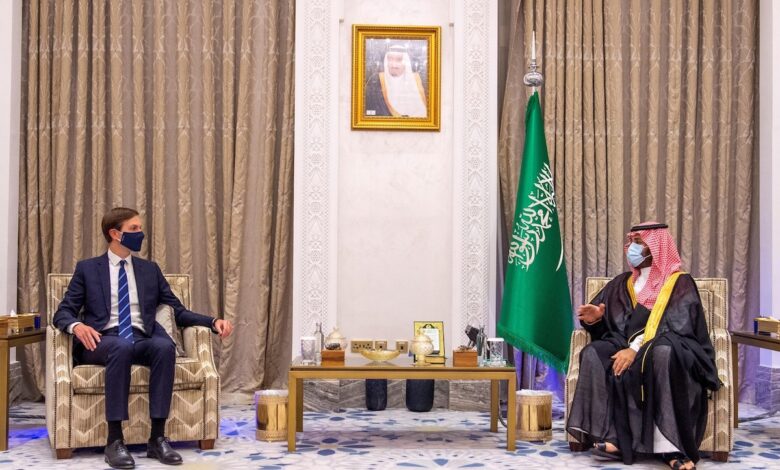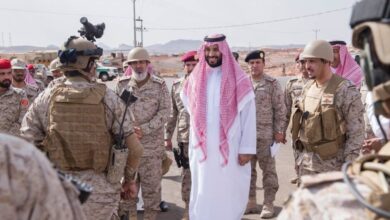The Washington Post: Saudi is the biggest loser of the Middle East changes

The Washington Post said that Saudi Arabia, under the leadership of Crown Prince Mohammed bin Salman, is the biggest loser from the changes taking place in the Middle East.
In an article by David Ignatius, the newspaper stated that in contrast to the remarkable rise of both Israel and Turkey in the Middle East, Saudi Arabia is the biggest loser in the region.
Ignatius pointed out that the kingdom has less influence in the region today than at any time in the past generation. Under Crown Prince Mohammed bin Salman, the Saudis are unpopular in Washington, but they have also suffered reversals in Yemen, Lebanon, Syria, Pakistan and other countries where their money and ideology were once a potent (if sometimes toxic) combination.
He stated that the message that the Donald Trump administration tried to present at the signing ceremony of agreements between Israel, the UAE and Bahrain was that the United States remains a strong force for peace and stability in the Middle East, but “Unfortunately, it was a misleadingly optimistic picture.”
“The United States is treading water in this turbulent region. It maintains residual military forces in Syria, Iraq and Afghanistan that are a check against terrorists, but the American presence is dwindling.”
“The future of the Middle East is about the decline of U.S. power and new internal dynamics, positive and negative, that are filling the vacuum.”
As President Trump nears the end of his term, he hasn’t met his goal of withdrawing U.S. troops entirely from “endless wars,” but he has come close.
By Election Day, the United States will have 4,500 troops in Afghanistan, about 3,000 in Iraq and fewer than 1,000 in Syria. Trump may wish the numbers were zero, but if he pulled the plug completely, he would make bad situations there worse.
And looking at the card of winners and losers in the region indicates that Israel may be the biggest beneficiary, as it is increasingly emerging from its isolation and signed two normalization agreements with two Arab countries.
The UAE is profitable, as it has expanded its similar European vision of open borders and investment. He quoted what an Emirati official said, “What we are trying to say, is enough of all this ideological nonsense, and we want to focus on the future, on science and technology, and as a business partner with everyone.”
A third winner is Turkey, a surprising and potentially dangerous beneficiary of the retreat of U.S. power. Some Arab leaders now regard Turkey as a greater threat than Iran to regional stability. The Turks and their proxy forces have been on a roll — in Syria, Libya and Iraq. Arab leaders who once complained about Iran’s domination of Arab capitals now bemoan Turkish influence in Aleppo, Mosul, Tripoli, Doha and Mogadishu.
Trump has been Erdogan’s chief enabler, but this deference may be ending — and not just because Trump could be defeated in November. Trump and Secretary of State Mike Pompeo both appear increasingly peeved by Erdogan’s headstrong push for regional hegemony and his flirtations with Russia.
The war zones of the region remain fragile, caught in a tug of war between Trump’s desire to withdraw troops and the Pentagon’s determination to stay until conditions are more stable.
In Afghanistan, the winners maybe the bad guys. A Taliban that’s “drunk with victory,” as one official puts it, hasn’t yet delivered on its promises to reduce violence and suppress al-Qaeda, even as it begins peace negotiations with the Kabul government. Trump has pledged to withdraw all U.S. troops by May if conditions allow — but U.S. commanders are skeptical this test will be met.
Trump has had some welcome success in Iraq. Prime Minister Mustafa al-Kadhimi, a former intelligence chief and political unknown, is proving to be one of the best Iraqi leaders since America invaded in 2003. He’s walking a tightrope between the United States and Iran — agreeing to host a reduced force of about 3,000 U.S. troops to train an Iraqi military that seems strong enough to suppress the Islamic State and is even standing up (occasionally) to Iranian-backed militias.
The Syrian nightmare persists, with the United States having lost most of its leverage because of Trump’s eagerness to invite Erdogan to invade the north. Turkey now controls a large swath of the country. The government of Bashar al-Assad is increasingly corrupt and disorganized; his Russian allies don’t have the resources or patience to clean up the mess.
Trump promised to withdraw U.S. forces by May if conditions were right. However, U.S. military commanders are sceptical. Trump achieved success in Iraq. Mustafa Al-Kazemi, a former intelligence director and politically unknown, proved to be one of the best Iraqi leaders since the U.S. invasion in 2003. He walks a thin rope between America and Iran and agreed to receive a low number of American forces, about 3.000 soldiers to train the strong Iraqi forces. Enough to confront the remnants of ISIS and sometimes stand against the militias supported by Iran. The Syrian nightmare continues as the United States lost all its influence because Trump allowed Erdogan to invade northern Syria.
Turkey controls a large area of the country. Bashar al-Assad’s government is increasingly corrupt and disorganized. His Russian allies do not have the money and patience to clean up the mess. Absent in Washington’s party was the Palestinians, the eternal losers in the Middle East game. Their only quid pro quo is their stubborn rejection of the Trump plan that endorses their defeat. The Palestinians will continue to exist as part of the never-ending wars and bother the victor in the November elections.





